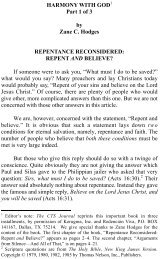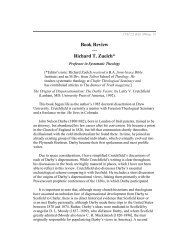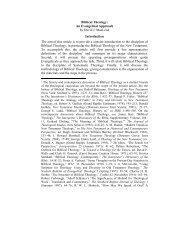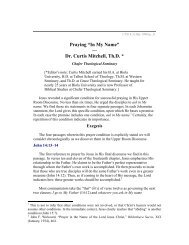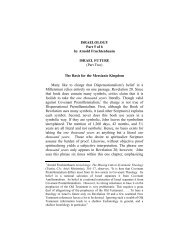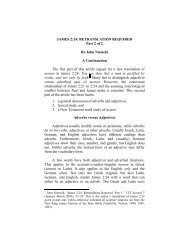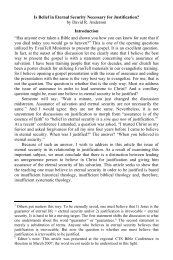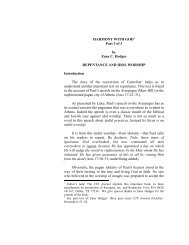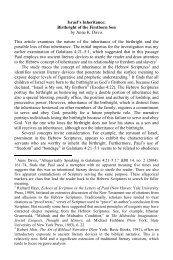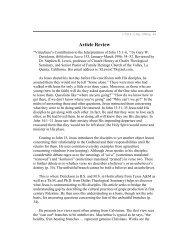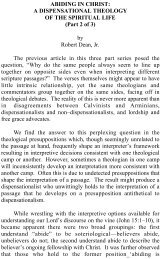WELCOME TO CHAFER THEOLOGICAL SEMINARY We extend a ...
WELCOME TO CHAFER THEOLOGICAL SEMINARY We extend a ...
WELCOME TO CHAFER THEOLOGICAL SEMINARY We extend a ...
You also want an ePaper? Increase the reach of your titles
YUMPU automatically turns print PDFs into web optimized ePapers that Google loves.
Page 44 Chafer Theological Seminary Catalog 2009-2011<br />
THE GRACE RESPONSIBILITIES<br />
OF BELIEVERS<br />
The Christian’s reasonable service of worship is to become a disciple of Christ, living in a manner worthy of<br />
his high calling in Christ. It is the obligation and privilege of every believer to witness by life and by word to<br />
the truths of Scripture and to seek to promote the gospel in all the world. It is the responsibility of all<br />
believers to remember the work of the Lord in prayer and to support it with their financial resources as the<br />
Lord has prospered them (Acts 1:8; Romans 12:1–2; 14:13; 1 Corinthians 5:9–13; 16:2; 2 Corinthians 5:20;<br />
6:14–7:1; 9:7; Philippians 2:1–11; 1 John 2:6).<br />
<strong>We</strong> believe the following principles are to be followed for proper conduct where doubtful things, that is,<br />
things not specifically addressed in the Bible, exist:<br />
(1) One must recognize that Christ gives the believer liberty to participate in what the Scripture does<br />
not prohibit (Romans 14:14; 1 Corinthians 6:12; 10:23; Galatians 5:1; Titus 2:15).<br />
(2) One must understand that personal liberty is not the highest principle of conduct—love is (1<br />
Corinthians 8:1, cf. 9–11)! Consequently, if using one’s liberty to participate in a doubtful thing<br />
causes a weaker Christian to stumble, then out of love, the stronger Christian should not<br />
participate. To cause a weaker believer to stumble is to influence him or her to take part in<br />
something against his weaker conscience. This becomes an act of personal sin for both people<br />
(Romans 14:23; 1 Corinthians 8:10, 12). Accordingly, to cause another to stumble does not mean<br />
merely to perturb or irritate him, but rather to entice him to participate in something contrary to<br />
the dictates of his weaker conscience (cf. Romans 14:23).<br />
(3) When fellow Christians disagree on their management of doubtful things, they should live and let<br />
live! They should not attempt to pass judgment on the opinions of others in the area of doubtful<br />
things (Romans 14:1), but rather let each man be fully convinced in his own mind (Romans<br />
14:5). This is dealing with one another in grace!<br />
The ultimate goal of the Holy Spirit’s work in the believer’s life is to produce spiritual maturity reflected in<br />
consistent Christlike attitudes and behavior that glorify God (Galatians 5:22–25; Colossians 1:23–29).<br />
Obedience to the Word of God, therefore, while not necessary for obtaining eternal salvation from Hell, is<br />
the essential responsibility of each Christian (Romans 6:12–23; 1 Corinthians 2:14–3:4; Hebrews 5:13–14).<br />
The Bible does not teach that obedience will be manifested to the same degree in all believers. If a believer<br />
does not yield to the ministry of the Holy Spirit in his or her experience, failure will result. This will be<br />
evidenced by sinful acts or even prolonged disobedience (1 Corinthians 10:1–13; Galatians 5:16–21). The<br />
Bible labels this failure carnality, or living that is characterized by the control of the flesh, during which the<br />
believer looks no different than the unbeliever (1 Corinthians 3:1–4). God responds to carnal behavior with<br />
divine discipline (Hebrews 12:4–13), which may come in degrees, even to physical death (1 Corinthians<br />
11:30).



